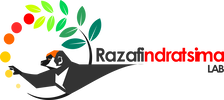Razafindratsima Lab
Diversity, Equity, Inclusion and Belonging Statement
This statement was crafted and approved by all lab members. We will revisit it regularly.
We are committed to welcome and support lab members from diverse backgrounds, races and ethnicities, gender identities and sexualities, religions, abilities, and other personal identities. We aim towards an equitable and inclusive community. Our specific actions to meet these goals include the following:
We acknowledge that our offices are located on the ancestral and unceded traditional territories of the Ohlone people. We also acknowledge that our field sites are located on the ancestral lands of the Tanala, Betsileo, Betsimisaraka, Bezanozano, Tsimihety, and Sakalava people in Madagascar. In Mexico, the study areas once formed part of a more expansive land ownership of the Ch’ol and Tseltal indigenous people. We acknowledge this to thank the Indigenous communities who have held relationships with these lands for generations but also to recognize the historical and ongoing legacy of colonialism as a point of reflection for us as we work towards decolonization practices.
We are committed to welcome and support lab members from diverse backgrounds, races and ethnicities, gender identities and sexualities, religions, abilities, and other personal identities. We aim towards an equitable and inclusive community. Our specific actions to meet these goals include the following:
- We respect each other’s identities.
- We ensure all team members receive training and support, from within the lab or outside when needed, to grow/develop the skills needed to succeed regardless of their starting point.
- We acknowledge the support and mentorship of those who came before us in aiding our professional journeys, and seek to pay this forward through our mentorship and outreach activities.
- We build strong relationships among lab members through social activities to make space for an environment of trust, cultural understanding, and belonging.
- We share all opportunities for career advancement (e.g., grants, training opportunities) to everyone, through our mailing list, Slack, and an Excel database in our shared folder. This allows team members to self-determine their readiness and eligibility for opportunities and reduces unintentional bias.
- We make space for open discussion about societal and ethical issues that affect our group members and others in the community.
- We provide clear expectations and maintain continuous conversations to check in on progress, and provide feedback and support as needed between trainee and mentor on both scientific and career goals.
- We are committed to addressing any instances of discrimination or harm within our community, holding ourselves accountable for supporting those harmed, and committing to resolving such issues by supporting the conversations, and learning that can lead to behavioral changes and by calling-in appropriate university support when needed.
- We engage in outreach efforts to engage with communities beyond those traditionally engaged in academia, seeking to empower folks with diverse backgrounds to see themselves in the scientific community through sharing our own stories.
- We avoid parachute science and neocolonial practices in field research by working with and establishing partnerships with the communities at our field sites. We acknowledge and uplift the importance of diverse types of knowledge and skillsets that make our work possible. We also make the results of our research accessible to local collaborators and communities by sending them reports, conducting outreach activities, and summarizing our published articles in the language of the field site.
- We are committed to making our fieldwork plan safe and adequate for everyone involved, taking into account differences in cultural and educational backgrounds and abilities, and the level of comfort in remote locations.
- We attempt to create a healthy work environment by not equating self-worth to scientific success and devotion to hours spent in the lab and by recognizing and respecting each person’s right to personal privacy.
- We encourage the participation of all lab members in our activities but also understand and respect if anyone feels the need to not participate for any reason that they do not need to disclose.
- We acknowledge that we make mistakes and take action to correct ourselves.
We acknowledge that our offices are located on the ancestral and unceded traditional territories of the Ohlone people. We also acknowledge that our field sites are located on the ancestral lands of the Tanala, Betsileo, Betsimisaraka, Bezanozano, Tsimihety, and Sakalava people in Madagascar. In Mexico, the study areas once formed part of a more expansive land ownership of the Ch’ol and Tseltal indigenous people. We acknowledge this to thank the Indigenous communities who have held relationships with these lands for generations but also to recognize the historical and ongoing legacy of colonialism as a point of reflection for us as we work towards decolonization practices.

